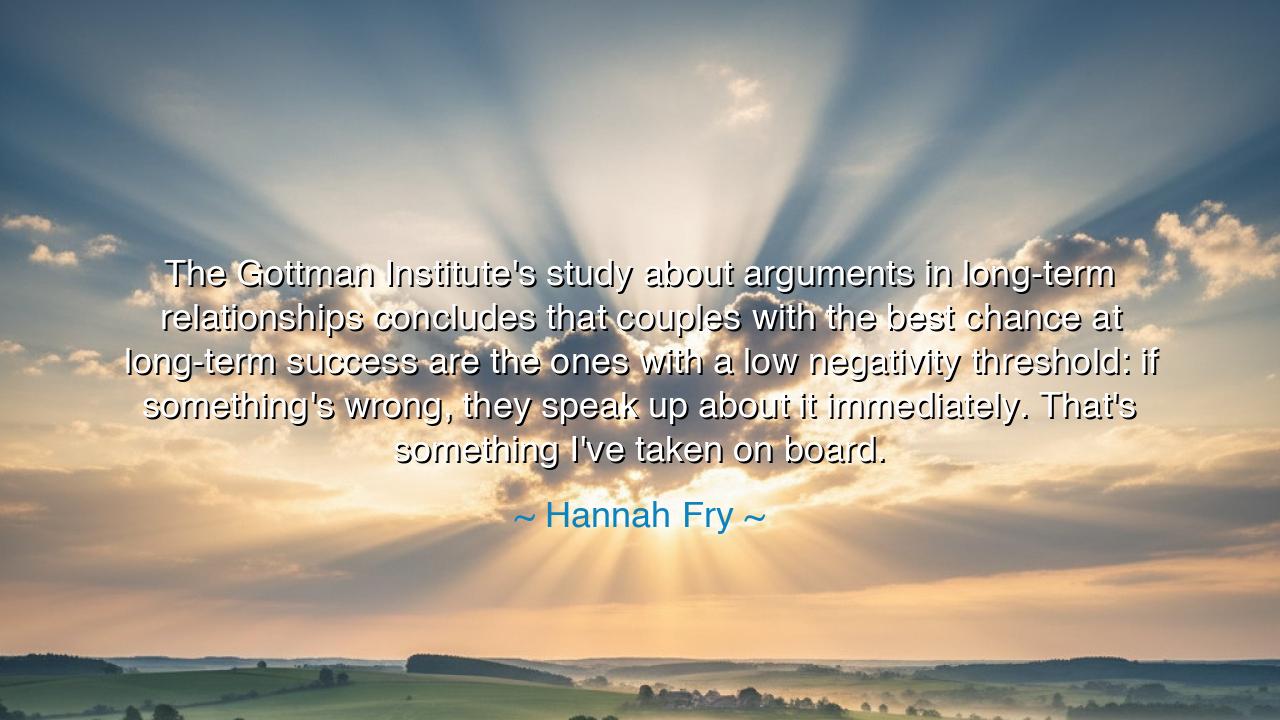
The Gottman Institute's study about arguments in long-term
The Gottman Institute's study about arguments in long-term relationships concludes that couples with the best chance at long-term success are the ones with a low negativity threshold: if something's wrong, they speak up about it immediately. That's something I've taken on board.






In the sacred bond of relationships, whether forged in love, friendship, or family, the foundation of lasting connection rests not just upon shared moments of joy, but on the strength to face conflict openly and with resolve. Hannah Fry, in reflecting on the findings of the Gottman Institute, speaks to this truth when she states: "The Gottman Institute's study about arguments in long-term relationships concludes that couples with the best chance at long-term success are the ones with a low negativity threshold: if something's wrong, they speak up about it immediately. That's something I've taken on board." Here, Fry reveals the wisdom of addressing discontent not through silence or avoidance, but by embracing the courage to speak when discomfort arises, for only then can a relationship grow stronger, more resilient, and more honest.
The ancients were well-versed in the art of relationships, understanding that conflict was inevitable but that the manner in which it was handled determined the fate of the connection. Aristotle, in his Nicomachean Ethics, speaks of friendship as being built not just on shared good times, but on the ability to navigate disagreements with wisdom and respect. True friends, according to Aristotle, are those who can confront their difficulties together, with openness and honesty, for in this way they strengthen one another. Hannah Fry’s reflection is a modern echo of this ancient wisdom: that in order for a bond to endure, it must be founded on communication—the willingness to confront tensions before they fester into something more corrosive.
Consider the example of Plato’s dialogues, where the philosopher often depicted his ideal relationships not as those free from conflict, but as those where conflict was met with dialogue. In the Symposium, the characters engage in deep philosophical debates, exploring their differences openly in a space where ideas, not egos, are at stake. This pursuit of truth, even when uncomfortable, lays the foundation for lasting intimacy. Plato, too, teaches that the ability to voice concerns, even in difficult conversations, is an essential part of creating relationships that are not just long-lasting but transformative. In this same vein, Fry’s adoption of the Gottman Institute’s study emphasizes that relationship success is not just about avoiding conflict, but about engaging with it directly, with respect and understanding.
This ancient understanding of communication and resolution finds further resonance in the story of Cleopatra and Julius Caesar. Their relationship, marked by political alliance and love, was not without its tensions. Yet, it is said that Cleopatra, known for her intelligence and decisiveness, never shied away from confronting Caesar when necessary, ensuring that their union remained strong through open discussion of their ambitions and challenges. Their bond endured not because they were without conflict, but because they had the courage to address it, recognizing that silence or avoidance would have fractured their shared path. Similarly, in modern relationships, as Fry reflects, the willingness to speak up immediately when something is wrong is what ensures that the connection can weather any storm.
The Gottman Institute's study adds a scientific layer to this ancient wisdom. It reveals that the most successful couples are those who do not allow resentment or misunderstanding to accumulate. By speaking up immediately, they prevent the growth of negativity that can slowly erode their relationship. This is not an easy task; it requires courage, vulnerability, and the commitment to engage with each other honestly, even when doing so might be uncomfortable. Yet, as Fry emphasizes, this is the path to long-term success. Just as the great warriors of old knew that the battle was won not by avoiding confrontation, but by meeting it head-on with strength and strategy, so too must we approach relationship challenges with the resolve to engage, listen, and speak.
The lesson here, then, is clear: in all relationships, whether personal or professional, communication is not merely a tool, but the very foundation upon which trust and understanding are built. The key to a successful, enduring bond lies not in avoiding conflict, but in addressing it with clarity, honesty, and compassion. Just as Aristotle and Plato understood that the strength of friendship lies in the ability to face disagreements openly, so too must we, in our own lives, cultivate the courage to speak when something feels wrong. In doing so, we not only preserve the connection, but we also deepen it, ensuring that it is rooted in mutual respect, understanding, and the shared goal of growth.
In our daily lives, let us take Fry’s wisdom to heart. Let us adopt the courage to speak openly when tensions arise, knowing that by doing so, we are not only preventing resentment but also laying the groundwork for stronger relationships built on honesty and respect. Whether in our marriages, friendships, or partnerships, the willingness to speak up immediately creates a space where growth and connection can flourish. Let us walk the path of communication, understanding that in every difficult conversation lies the potential for a deeper, more meaningful bond—one that will endure the tests of time and challenge.






AAdministratorAdministrator
Welcome, honored guests. Please leave a comment, we will respond soon